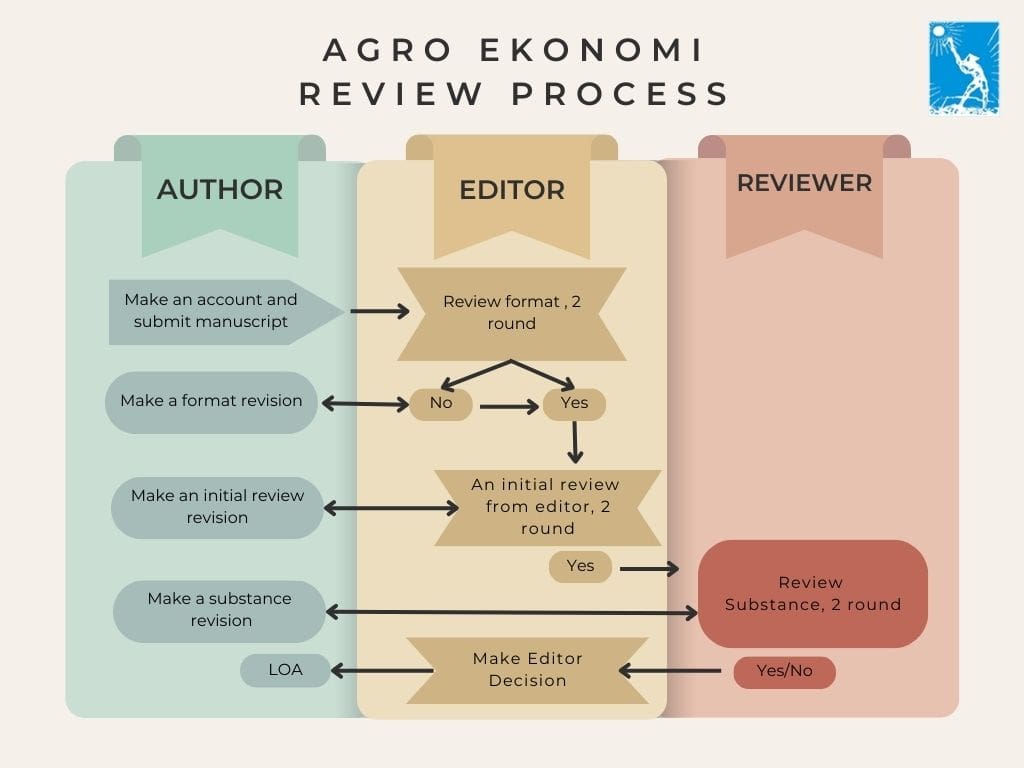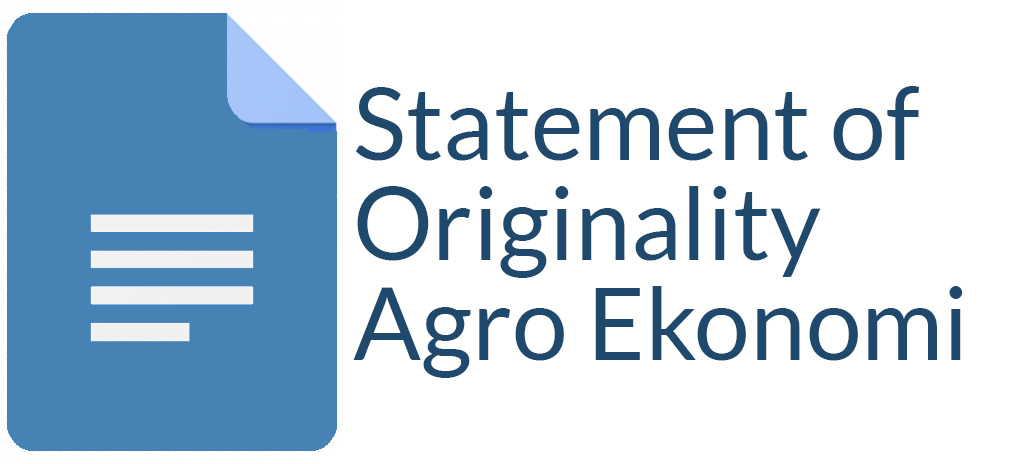Are Official Statistics Underexploited by Researchers and Policymakers? The Case of Agriculture Sector in Indonesia
Dominicus Savio Priyarsono(1*), Fahmi Salam Ahmad(2)
(1) Department of Economics, Faculty of Economics and Management, IPB University
(2) Department of Economics, Faculty of Economics and Management, IPB University
(*) Corresponding Author
Abstract
This study is intended to evaluate the utilization of official statistics for academic research as well as for policymaking in agriculture sector in Indonesia. To achieve the goal a conceptual framework of the relationship among official statistics, academic research, and policymaking was constructed. The intensity of official statistics use for academic research was examined by analyzing the content of 7814 articles published in all 47 scientific journals officially affiliated with the Indonesian Society of Agricultural Economics (PERHEPI), 1978-2023. It is found that the majority of the articles (62.6%) did not use BPS data. Furthermore, in the last two decades the utilization of secondary data for academic research papers tends to decrease, from 55.7% of the total articles published in 2004-2013 to 42.4% in 2014-2023. These results of calculation and other quantitative analyses were shown to 80 prominent resource persons for evaluation. The majority of the respondents assessed that the level of utilization of BPS data was low or very low. The factors that determine the level of utilization are relevance, accessibility, preference, and quality of the data. The respondents also identified the needs to solve the problems of communication, collaboration, and coordination among the stakeholders of the ecosystem (official statistics agency, academia, and policymakers) to improve the functioning of the ecosystem of data utilization. These findings are potentially beneficial for providing points of consideration in public discourses including those for revising the statistics law (UU Statistik) that has been undertaken by lawmakers in the Indonesian parliament (DPR) since 2023.
Keywords
Full Text:
PDFReferences
Baron, J. (2018). A Brief History of Evidence-Based Policy. Annals of the American Academy of Political and Social Science, 678(1), 40–50. https://doi.org/10.1177/0002716218763128
Blomkamp, E., Sholikin, M. N., Nursyamsi, F., Lewis, J. M., & Toumbourou, T. (2018). Understanding Policymaking in Indonesia: In Search of a Policy Cycle.
Boswell, C., & Smith, K. (2017). Rethinking policy “impact”: Four models of research-policy relations. Palgrave Communications, 3(1). https://doi.org/10.1057/s41599-017-0042-z
Cairney, P., & Oliver, K. (2020). How Should Academics Engage in Policymaking to Achieve Impact? Political Studies Review, 18(2), 228–244. https://doi.org/10.1177/1478929918807714
Capano, G., & Malandrino, A. (2022). Mapping the use of knowledge in policymaking: barriers and facilitators from a subjectivist perspective (1990–2020). Policy Sciences, 55(3), 399–428. https://doi.org/10.1007/s11077-022-09468-0
Duiveman, R. (2020). Making research relevant to policymaking: from brokering boundaries to drawing on practices. Policy Studies, 41(1), 23–41. https://doi.org/10.1080/01442872.2018.1539226
Fusco, G. (2021). Twenty years of common agricultural policy in europe: A bibliometric analysis. In Sustainability (Switzerland) (Vol. 13, Issue 19). MDPI. https://doi.org/10.3390/su131910650
Gava, O., Bartolini, F., Venturi, F., Brunori, G., & Pardossi, A. (2020). Improving policy evidence base for agricultural sustainability and food security: A content analysis of life cycle assessment research. Sustainability (Switzerland), 12(3). https://doi.org/10.3390/su12031033
Hamman, E., Deane, F., Kennedy, A., Huggins, A., & Nay, Z. (2021). Environmental regulation of agriculture in federal systems of government: The case of Australia. Agronomy, 11(8). https://doi.org/10.3390/agronomy11081478
Hillgren, P. A., Light, A., & Strange, M. (2020). Future public policy and its knowledge base: shaping worldviews through counterfactual world-making. Policy Design and Practice, 3(2), 109–122. https://doi.org/10.1080/25741292.2020.1748372
Hoshide, A. K. (2023). Sustainable Development Agricultural Economics and Policy: Intensification versus Diversification. In Sustainability (Switzerland) (Vol. 15, Issue 12). MDPI. https://doi.org/10.3390/su15129716
Houaga, R. P., Moumouni, I. M., & Gouroubera, M. W. (2023). Policies and Intervention Approaches Challenges in Promoting Agricultural Innovation: The Case of The Cashew Sector in Benin. Journal of Agricultural Policy, 6(1), 1–17. www.carijournals.orgwww.carijournals.orgwww.carijournals.org
Laiprakobsup, T. (2019). The policy effect of government assistance on the rice production in Southeast Asia: Comparative case studies of Thailand, Vietnam, and the Philippines. Development Studies Research, 6(1), 1–12. https://doi.org/10.1080/21665095.2019.1568900
Mahy, P. (2022). Indonesia’s Omnibus Law on Job Creation: Legal Hierarchy and Responses to Judicial Review in the Labour Cluster of Amendments. Asian Journal of Comparative Law, 17(1), 51–75. https://doi.org/10.1017/asjcl.2022.7
Márquez-Ramos, L. (2020). A Survey of Papers Using Indonesian Firm-Level Data: Research Questions and Insights for Novel Policy-Relevant Research in Economics. Bulletin of Indonesian Economic Studies, 2020, 1–49. https://doi.org/10.1080/00074918.2020.1862410
Mdee, A., Ofori, A., Chasukwa, M., & Manda, S. (2021). Neither sustainable nor inclusive: a political economy of agricultural policy and livelihoods in Malawi, Tanzania and Zambia. Journal of Peasant Studies, 48(6), 1260–1283. https://doi.org/10.1080/03066150.2019.1708724
Metz, F., Lieberherr, E., Schmucki, A., & Huber, R. (2021). Policy Change Through Negotiated Agreements: The Case of Greening Swiss Agricultural Policy. Policy Studies Journal, 49(3), 731–756. https://doi.org/10.1111/psj.12417
Navarro, I. J., Marti, J. V., & Yepes, V. (2023). Evaluation of Higher Education Students’ Critical Thinking Skills on Sustainability. International Journal of Engineering Education, 39(3), 592–603. https://doi.org/10.13039/501100011033
Prasetiamartati, B., Carden, F., Ruhanawati, S., Rakhmani, I., & Nugroho, Y. (2018). Linking academic research and policymaking. In Knowledge, Politics and Policymaking in Indonesia (pp. 13–30). Springer Singapore. https://doi.org/10.1007/978-981-13-0167-4_2
Priyarsono, D. S. (2023a). Agricultural census 2023: Avenues for research on agricultural development. https://fmsindonesia.id/wp-content/uploads/2023/10/Buletin-21-FINAL.pdf
Priyarsono, D. S. (2023b). Sensus Pertanian 2023: Mengapa sangat penting? (2023 Agriculture Census: Why is it very important?). Republika.
Purnamasari, M., Huang, W. C., & Priyanto, B. (2023). The Impact of Government Food Policy on Farm Efficiency of Beneficiary Small-Scale Farmers in Indonesia. Agriculture (Switzerland), 13(6). https://doi.org/10.3390/agriculture13061257
Stinner, M. (2018). Disclosure Control and Random Tabular Adjustment.
Yu, J., & Wu, J. (2018). The sustainability of agricultural development in China: The agriculture-environment nexus. In Sustainability (Switzerland) (Vol. 10, Issue 6). MDPI. https://doi.org/10.3390/su10061776
Yung, W. (2021). The Evolution of Official Statistics in a Changing World. Harvard Data Science Review, 3(4). https://doi.org/10.1162/99608f92.48466abe
Article Metrics
Refbacks
- There are currently no refbacks.
Copyright (c) 2023 Agro Ekonomi

This work is licensed under a Creative Commons Attribution-ShareAlike 4.0 International License.
View My Stats












